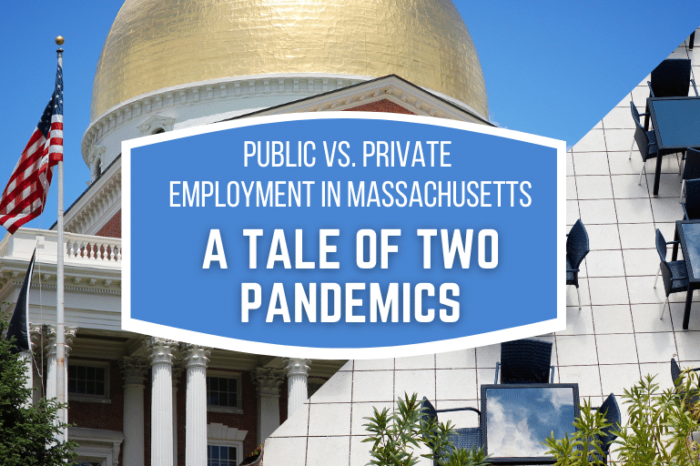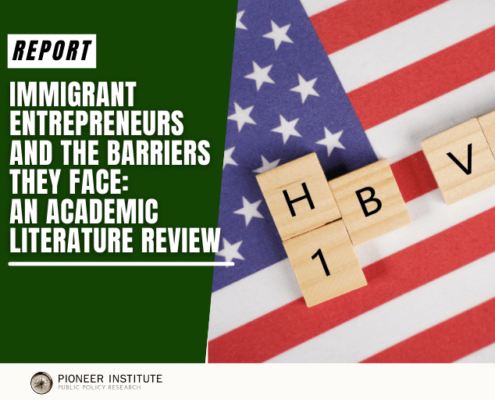Report Contrasts State Government and Private Sector Employment Changes During Pandemic
Read coverage of this report in Patch: “MA State Workers Had More Job Security In Pandemic: Study.”
BOSTON – Massachusetts state government employment has been virtually flat during COVID-19 even as employment in the state’s private sector workforce remains nearly 10 percent below pre-pandemic levels, according to a new study published by Pioneer Institute. The study, “Public vs. Private Employment in Massachusetts: A Tale of Two Pandemics,” questions whether it makes sense to shield public agencies from last year’s recession at the expense of taxpayers.
“Compared to restaurants, retailers and other businesses, there was very little pressure on state government to cut costs associated with COVID’s economic fallout,” said Serena Hajjar, who authored the study. “The private sector has felt the bulk of the pain of this contraction.”
At one point in April 2020, total employment in Massachusetts was 23 percent below pre-pandemic levels, while at the same time state-level government employment was higher than it was in February 2020.
Using Pioneer Institute’s state employee tracker in MassOpenBooks, researchers highlight employment changes among particular state agencies. As might be expected during a pandemic, the Department of Children and Families and the Department of Public Health have higher employment levels than before the pandemic. Perhaps more surprisingly, the MBTA, whose ridership stands at a third of February 2020 levels, has also gained employees.
Some large educational, law enforcement, and judicial institutions have lost employment. The University of Massachusetts system and the Department of Corrections experienced 4 and 3 percent year-over-year employment declines, respectively.
In the private sector, employment in the leisure and hospitality sector — which includes bars, restaurants, and hotels — hasn’t surpassed 70 percent of pre-pandemic levels since last spring. As of February 25, 2021, in-store retailers still face a 50 percent occupancy cap due to ongoing virus concerns. Over the 12-month period ended January 31, 2021, the number of small businesses open in Massachusetts declined by nearly 38 percent.
“During the pandemic the private sector took it on the chin while public sector employees, for the most part, were treated as a protected class,” said Pioneer Institute Executive Director Jim Stergios. “To turn around now and raise taxes to placate public sector unions’ desire to bolster their ranks is willful blindness to reality. State employees represent 3 percent of all employees in the Commonwealth. Coming out of the pandemic, the legislature needs to focus on growing private sector jobs, not taxing them.”
About the Author
Serena Hajjar is an independent contractor at Pioneer Institute, focusing on transparency around the state’s reporting of coronavirus figures and the effects of the coronavirus response on the state economy. Ms. Hajjar is a recipient of the Fulbright English Teaching Assistant Grant to Russia for the 2020–21 cycle. She has a B.A. in international relations and Russian and Eastern European studies from the University of Pennsylvania.
About Pioneer
Pioneer’s mission is to develop and communicate dynamic ideas that advance prosperity and a vibrant civic life in Massachusetts and beyond.
Pioneer’s vision of success is a state and nation where our people can prosper and our society thrive because we enjoy world-class options in education, healthcare, transportation, and economic opportunity, and where our government is limited, accountable and transparent.
Pioneer values an America where our citizenry is well-educated and willing to test our beliefs based on facts and the free exchange of ideas, and committed to liberty, personal responsibility, and free enterprise.
Get Updates on Our Economic Opportunity Research
Related Content:





 Image by Freepik.com
Image by Freepik.com








